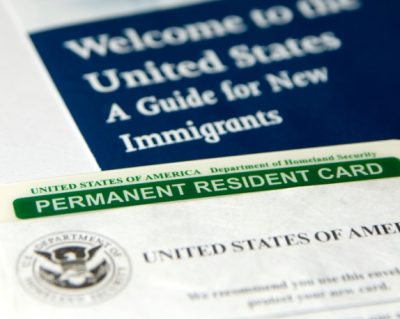Immigration Benefits and Relief
The immigration laws and regulations provide some avenues to apply for lawful status from within the U.S. or to seek relief from deportation. The eligibility requirements for these benefits and relief can be stringent, and the immigration agencies often adopt overly restrictive interpretations of the requirements. Learn about advocacy and litigation that has been and can be undertaken to ensure that noncitizens have a fair chance to apply for the benefits and relief for which they are eligible. Providing avenues for legal status, protection, and family reunification is vital to ensuring humanitarian protection for immigrants. We are leading policy changes that open more opportunities like asylum, visas for victims of crime or human trafficking, and relief for long-term residents. Explore the resources below to learn more.

Why Deferred Action is Not Amnesty
Long before President Obama announced his plan on deferred action for childhood arrivals, immigration restrictionists were arguing that any exercise of prosecutorial discretion benefitting undocumented immigrants was equivalent to “amnesty.” Consequently, it’s no surprise that one of the biggest myths supporters of the program have had to address is that deferred action is a type of amnesty. Read More

DHS Announces Application Process for Deferred Action, IPC Provides Data on Where Eligible Individuals Reside
Washington D.C. – Today, U.S. Citizenship and Immigration Services (USCIS) released important details about the Deferred Action for Childhood Arrivals (DACA) process, which will temporarily allow some eligible youth to go to school and work without fear of deportation. A recent Immigration Policy Center (IPC) report,Who and… Read More

How Should Obama Administration Proceed with Deferred Action Program?
In a June 15th memo announcing deferred action for immigrant youth, DHS Secretary Janet Napolitano gave USCIS 60 days to come up with a process that will allow these young people to affirmatively apply for the chance to work, study, and live in the U.S. without fear of deportation. To be sure, USCIS staff and their counterparts at ICE, CBP, and DHS, have been entrusted with a difficult job—one that requires balancing legal and practical implementation issues against high expectations and years of built up frustration over the lack of immigration reform. But the real challenge is acknowledging that every single decision they make about the program has the chance to make it harder or easier for young people to realize their dreams. Read More

Economic Benefits of Granting Deferred Action to Unauthorized Immigrants Brought to U.S. as Youth
There are an estimated 1.4 million children and young adults in the United States who might benefit from President Obama’s announcement that the Department of Homeland Security would begin granting deferred action (and Employment Authorization Documents) to unauthorized immigrants who were brought to the United States as minors. For many of these young people, the United States is the only home they know and English is their first language. Each year, tens of thousands of them graduate from primary or secondary school, often at the top of their classes. They have the potential to be future doctors, nurses, teachers, and entrepreneurs, but their lack of legal status has prevented them from attending college or working legally. The President’s deferred action initiative will provide an opportunity for them to live up to their full potential and, in the process, make greater contributions to the U.S. economy. Read More

Dream Come True: Obama Administration Announces Relief for DREAMers
Washington. D.C. – The American Immigration Council applauds today’s announcement by the Obama administration that it will grant deferred action to undocumented youth who were brought to the United States as small children and who have been raised and educated in communities around the country. Today’s announcement builds on the… Read More

Standardizing Guidelines Would Improve USCIS’s Proposed Family Unity Waiver Rule
Earlier this year, USCIS proposed a new waiver rule that would allow some unauthorized immigrants (mostly direct family members of U.S. citizens) who are applying for a green card to apply for a waiver to the 3 and 10 year bar from within the United States, minimizing the amount of time they would have to be away from their families. While many welcome this proposed rule change, there are ways in which USCIS could streamline this process. In addition to previously suggested improvements, USCIS could provide training and guidelines on the extreme hardship standard to ensure that the standard is applied consistently. The “comment period,” which is open to the public and can be used to suggest improvements to the rule, end this Friday, June 1. Read More

Expansion of Proposed Waiver Rule Could Help More Families Stay Together
As previously noted, the administration recently proposed a new rule that would help keep American families —the “Proposed Rule on Provisional Unlawful Presence Waivers of Inadmissibility for Certain Immediate Relatives.” This proposed rule would streamline the application process for many relatives of U.S. citizens currently eligible for a green card by minimizing the amount of time that applicants would have to be away from their families before being admitted into the United States. While the proposed rule is certainly a welcome change and would be an improvement over current procedures, there are ways in which the rule could be improved to help even more immigrants. Read More

Falling through the Cracks
How Gaps in ICE's Prosecutorial Discretion Policy Affect Immigrants Without Legal Representation While the Obama administration’s has expanded use of prosecutorial discretion in immigration cases, the subject of immigrants without legal representation and their ability to access this discretion remains unresolved. In 2011, nearly half of all immigrants in removal proceedings appeared “pro se,” or without legal representation. While immigration attorneys can explain the effect of these policies to their clients, pro se immigrants may be unaware that new policies are even in effect. Immigrant advocates have thus been rightly concerned about whether pro se immigrants in removal proceedings will benefit from Immigration and Customs Enforcement’s (ICE) prosecutorial discretion policies. This paper lays out what immigration authorities can do to ensure that pro se immigrants understand what prosecutorial discretion is, how they can seek it, and what they should do after receiving (or not receiving) an offer of it. Read More

Prosecutorial Discretion in Context: How Discretion is Exercised Throughout Our Immigration System
Discretion takes many forms throughout the immigration enforcement process. Every removal of a noncitizen from the United States, for example, reflects a series of complex choices which reflect discretion. To understand the role of discretion fully, however, we need to examine the entire range of opportunities to exercise discretion in immigration enforcement and the cast of decision makers who make discretionary decisions, such as members of Congress who enact laws, Department of Homeland Security (DHS) officers who make arrests, Immigration and Customs Enforcement (ICE) trial attorneys who represent the government in removal proceedings, and immigration judges who preside over those proceedings. This Special Report traces the role of discretion throughout the immigration enforcement process. Understanding these roles is important not only in individual cases, but also in how policymakers write regulations and draft laws. Knowing how the enforcement system anticipates and incorporates discretion is key to understanding how our immigration laws work. Listen to Hiroshi Motomura discuss this report. Read More

American Immigration Council and Partners Sue U.S. Immigration Agencies Over Asylum “Clock”
Washington, D.C.—Last week, the American Immigration Council’s Legal Action Center (LAC) filed a nationwide class action lawsuit against U.S. Citizenship and Immigration Services (USCIS) and the Executive Office for Immigration Review (EOIR) in federal court in Seattle. The lawsuit alleges widespread problems with the asylum “clock”—the system… Read More
Make a contribution
Make a direct impact on the lives of immigrants.
